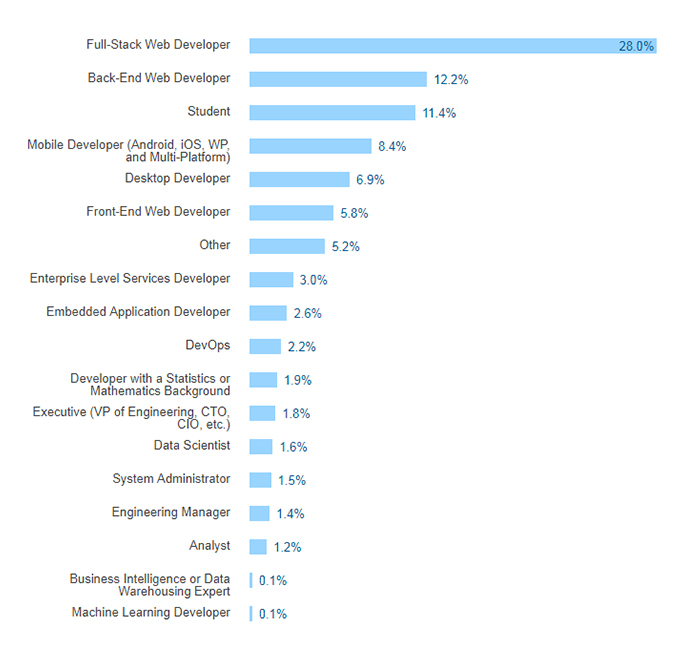The term full stack has been widely used in recent years as a way to define a type of developer. In other words, it is a professional capable of working with the entire development stack of an application. Some people characterize a developer as a full stack if it works with the front-end and back-end, others consider a developer as full stack if it can act not only on the front and back end but on all steps and parts of the development such as the database and server. Let’s study in detail:
Front-end
A full stack developer is capable to develop the “front” of the website that is the visible part for the visitor. The most common situation is that a full-stack developer translates a web design (irrespectively a number of images) into a working whole in the browser. This includes interactions and visual effects. For programming the front-end HTML, CSS and Javascript are used. When all unique views of the website have been worked out, the code is transferred to a back-end who programs the intelligence behind the whole.
Back-end
The back end of an application is the part that is not visible to the user. This often takes the form of a dashboard in which administrators can make changes and add new data. A full-stack developer supports the front-end (that which the user actually sees) and usually ensures that the front-end can communicate with back-end and other programs and applications. The back-end environment uses a login system, often with different (access) rights for different administrators.
The application receives data from the front-end and stores it in a database: a large collection of data that runs on a server. From this server, the data can be re-requested by the application at later times.
In general, a full stack developer also manages the database, the server and the application by using the following programming languages:
- PHP
- Python
- ASP.NET
- ColdFusion
- Delphi
- Ruby

https://insights.stackoverflow.com/
Apart from managing the front-end and back-end business, A full-stack developer comprises of the below given roles:
1. Develop web applications
The most important task: to develop web applications. The full stack (web) developer writes new software. He also modifies and maintains existing programs. The all-round software developer is ultimately responsible for the delivery of a working, professional software product. He monitors agile principles and Scrum practices and ensures that backend and frontend work smoothly towards the same goals.
2. Build software solutions
Hire Full-stack developers to create innovative solutions to streamline technological processes. They maintain complex infrastructures, implement new functions and make strategic plans for future projects in collaboration with a DevOps team.
3. Software lifecycle management
Full-stack technicians master the entire process of application and software development. They use design principles for optimum product specifications. Full-stack IT professionals implement changes in existing applications and tests (automated) on user-friendliness and safety. They monitor and give feedback.
4. Technical analysis and testing
Technical analysis is of course indispensable for the development of complex software. With the help of tests and data, it is determined whether a product meets the predetermined criteria. Based on this, the all-round developer makes complex technical considerations. What weighs the heaviest: speed or reliability, production or overall performance?
5. Lead technical cooperation
The full-stack technician is preferably experienced and oversees the entire development process with the Scrum Master to:
- maintain a strong technical development environment;
- facilitate group meetings with other departments to clarify product requirements and designs; maintains relationships with external technical suppliers;
- remain up-to-date with relevant technologies and new trends in order to determine the technical course.
Why should you hire our full stack developers?
Significantly our full stack developer is responsible for not only developing the functionalities of the systems but to raise the requirements with the client as well. Then it is also important that we can understand the business rules in which the project is inserted, identify the needs and demands. Once we have defined what needs to be done then it will start developing the solution. Some companies have teams that specialize in a certain area, but that does not prevent the full stack developer from being aware of what is happening there and that is able to participate in the process and work together. Already in other companies, he is responsible for developing the project from start to finish and to carry out future maintenance and evolutions thereof.
The day-to-day tasks of our full stack developer depend heavily on the project he is working on. If the project has many backlogged tasks in the back end for example, it is normal for it to spend more time working there.
Of course the routine of each one is different. Many full-stack developers also spend much of the day servicing an existing system, fixing bugs or making improvements. A problem that it solves frequently can be a poor UI interaction and it can be a logic error in a business rule where it can be an excessive slowness of a query in the database or it can be a large memory consumption in the server.
To Conclude
A full-stack professional is being much requested by the market, since many companies like to hire professionals who can see the project as a whole, being able to participate in all areas. Some companies choose to hire specialist developers from each area, others choose to hire full stack developers and some like to merge the two profiles.